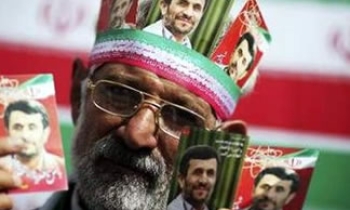An Indonesian court has cleared Playboy Indonesia's editor-in-chief of distributing indecent pictures to the public and making money from them after a high-profile trial that exposed deep divisions in the Muslim-majority nation

The publication, which does not contain nude pictures, "could not be categorised as pornography," presiding District Court Judge Efran Basyuning ruled Thursday. Its editor, Erwin Arnada, also was protected by press freedom laws enacted after the 1998 resignation of former dictator Suharto, the court decided.
"This is a great gift for Playboy Indonesia because up until today, for one year, my friends and I worked under pressure," Arnada told a news conference. "Today's verdict proved press freedom is respected in this country."
The trial was part of a broader struggle between a vocal minority of Islamic hardliners and the more tolerant majority in Indonesia, which has the world's largest Muslim population, Reuters commented.
Soleh, chairman of Indonesia's radical Islamic Defender Front, said Muslims were "very disappointed" and left "questioning the judge's conscience." Munarman, a lawyer for Muslim groups opposed to Playboy Indonesia, said legal action would continue against the magazine and other publications deemed indecent also would be targetted.
About 20 Islamic hardliners attended the trial, with a further 200 outside, watched by hundreds of police equipped with water cannon, the South China Morning Post reported. The verdict brought only a muted reaction from the group, which quickly dispersed.

"This is a bitter pill," said Bachtiar Ali, one of the protest organisers. "Do we have to wait until our wives and daughters are raped? We will keep fighting. Pornography is a moral crime that destroys the nation's faith."
Playboy published its first edition in Indonesia last April. Indonesia's version contains photos of scantily-clad women, including models in lingerie, but many pictures are no more revealing than pin-ups in the country's popular tabloid newspapers.
After it published its first issue, the Justice and Prosperity Party, an Islamic political group, introduced in Parliament a sweeping public morals bill that would ban all pornography and stipulate how women would be allowed to dress in public, and even dance, the New York Times said.
The bill has since been considerably watered down, and is still languishing in Parliament after almost a year. It generated a national uproar last year, with large protest demonstrations mounted by both sides, and the parliament’s failure to enact it is seen as a blow to the conservative movement.
The magazine, meanwhile, relocated its offices to the mostly Hindu island of Bali last year after they were attacked with stones by the Islamic Defender’s Front, which also regularly intimidated the magazine’s employees and advertisers.

Indonesia is a secular country with more Muslims than any other in the world, some 190 million. While most practice a moderate form of the faith, fundamentalists have been pushing hard to impose strict Islamic law. Hard-core pornographic videos and magazines also are widely available here so the Islamists' focus on much tamer Playboy suggested to many that it was singled out as a symbol of what hardliners consider Western pollution of Islamic morals, Reuters said.
Earlier, the Alliance of Independent Journalists (AJI), a constituent of the Southeast Asian Press Alliance (SEAPA), had said, “Playboy Indonesia - like other press publications such as Tempo magazine (which is news-based), Sabili magazine (which focuses on Islam), TSM magazine (military), F1 Racing magazine (automotive), Kosmopolitan magazine (lifestyle) and Penyebar Semangat (Javanese culture), has an equal right to exist and opportunity to improve. The only thing that can kill a publication is when it has no readers; but it is not killed due to ‘dislike’ or a difference in belief.”
According to AJI, as long as Playboy Indonesia meets existing legal requirements, such as possessing a permit for a business publication, there is no reason for any party to shut it down or to punish its management. Since 1999, Indonesia has had the Law No 40 on the Press, which guarantees press freedom and the public's right to information. The press can be punished if it is used to commit crime or if the management of the media commits a crime.









